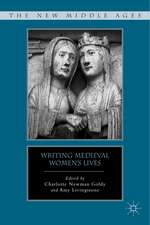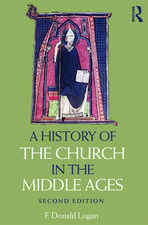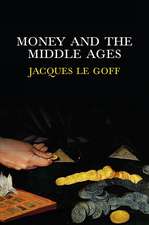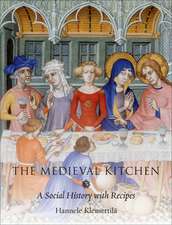Illuminating the Border of French and Flemish Manuscripts, 1270–1310: Studies in Medieval History and Culture
Autor Lisa Moore Hunten Limba Engleză Paperback – 4 iun 2010
| Toate formatele și edițiile | Preț | Express |
|---|---|---|
| Paperback (1) | 432.12 lei 6-8 săpt. | |
| Taylor & Francis – 4 iun 2010 | 432.12 lei 6-8 săpt. | |
| Hardback (1) | 1109.99 lei 6-8 săpt. | |
| Taylor & Francis – 23 oct 2006 | 1109.99 lei 6-8 săpt. |
Din seria Studies in Medieval History and Culture
-
 Preț: 302.09 lei
Preț: 302.09 lei -
 Preț: 310.41 lei
Preț: 310.41 lei - 9%
 Preț: 1039.98 lei
Preț: 1039.98 lei - 9%
 Preț: 1013.20 lei
Preț: 1013.20 lei -
 Preț: 311.14 lei
Preț: 311.14 lei -
 Preț: 310.89 lei
Preț: 310.89 lei -
 Preț: 309.23 lei
Preț: 309.23 lei -
 Preț: 310.95 lei
Preț: 310.95 lei -
 Preț: 311.48 lei
Preț: 311.48 lei -
 Preț: 665.95 lei
Preț: 665.95 lei -
 Preț: 481.58 lei
Preț: 481.58 lei -
 Preț: 434.84 lei
Preț: 434.84 lei - 18%
 Preț: 998.71 lei
Preț: 998.71 lei - 18%
 Preț: 998.71 lei
Preț: 998.71 lei -
 Preț: 449.41 lei
Preț: 449.41 lei -
 Preț: 435.59 lei
Preț: 435.59 lei -
 Preț: 444.62 lei
Preț: 444.62 lei -
 Preț: 320.36 lei
Preț: 320.36 lei -
 Preț: 486.80 lei
Preț: 486.80 lei - 31%
 Preț: 767.47 lei
Preț: 767.47 lei - 18%
 Preț: 1109.18 lei
Preț: 1109.18 lei - 18%
 Preț: 1109.99 lei
Preț: 1109.99 lei - 18%
 Preț: 1002.80 lei
Preț: 1002.80 lei -
 Preț: 478.71 lei
Preț: 478.71 lei - 18%
 Preț: 997.27 lei
Preț: 997.27 lei - 18%
 Preț: 835.96 lei
Preț: 835.96 lei -
 Preț: 433.86 lei
Preț: 433.86 lei -
 Preț: 499.74 lei
Preț: 499.74 lei -
 Preț: 479.47 lei
Preț: 479.47 lei - 31%
 Preț: 766.31 lei
Preț: 766.31 lei -
 Preț: 443.65 lei
Preț: 443.65 lei -
 Preț: 444.51 lei
Preț: 444.51 lei -
 Preț: 323.23 lei
Preț: 323.23 lei - 18%
 Preț: 1000.27 lei
Preț: 1000.27 lei - 12%
 Preț: 325.34 lei
Preț: 325.34 lei - 26%
 Preț: 763.97 lei
Preț: 763.97 lei - 18%
 Preț: 996.33 lei
Preț: 996.33 lei - 18%
 Preț: 1011.16 lei
Preț: 1011.16 lei -
 Preț: 436.14 lei
Preț: 436.14 lei - 18%
 Preț: 1007.82 lei
Preț: 1007.82 lei - 18%
 Preț: 1003.43 lei
Preț: 1003.43 lei - 18%
 Preț: 836.89 lei
Preț: 836.89 lei -
 Preț: 492.16 lei
Preț: 492.16 lei -
 Preț: 326.03 lei
Preț: 326.03 lei - 29%
 Preț: 653.67 lei
Preț: 653.67 lei -
 Preț: 442.71 lei
Preț: 442.71 lei - 26%
 Preț: 819.48 lei
Preț: 819.48 lei -
 Preț: 436.14 lei
Preț: 436.14 lei
Preț: 432.12 lei
Nou
Puncte Express: 648
Preț estimativ în valută:
82.68€ • 86.33$ • 68.43£
82.68€ • 86.33$ • 68.43£
Carte tipărită la comandă
Livrare economică 04-18 aprilie
Preluare comenzi: 021 569.72.76
Specificații
ISBN-13: 9780415802949
ISBN-10: 0415802946
Pagini: 264
Dimensiuni: 152 x 229 x 14 mm
Greutate: 0.36 kg
Ediția:1
Editura: Taylor & Francis
Colecția Routledge
Seria Studies in Medieval History and Culture
Locul publicării:Oxford, United Kingdom
ISBN-10: 0415802946
Pagini: 264
Dimensiuni: 152 x 229 x 14 mm
Greutate: 0.36 kg
Ediția:1
Editura: Taylor & Francis
Colecția Routledge
Seria Studies in Medieval History and Culture
Locul publicării:Oxford, United Kingdom
Cuprins
Chapter 1 Introduction; Chapter 2 Ars Profana in Cistercian Tomes; Chapter 3 Luxury Psalters by the Dampierre Group; Chapter 4 Re-Reading the BnF-Yale Romance; Chapter 5 Treasured Collections; Chapter 6 Opening Books, Underlining Authorities; Chapter 7 Conclusion;
Descriere
This study first examines the marginal repertoire in two well-known manuscripts, the Psalter of Guy de Dampierre and an Arthurian Romance, within their material and codicological contexts. This repertoire then provides a template for an extended study of the marginal motifs that appear in eighteen related manuscripts, which range from a Bible to illustrated versions of the encyclopedias of Vincent de Beauvais and Brunetto Latini. Considering the manuscript as a whole work of art, the marginalia’s physical relationship to nearby texts and images can shed light on the reception of these illuminated books by their medieval viewers.




















